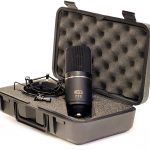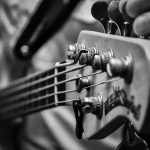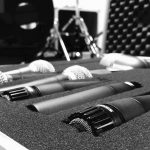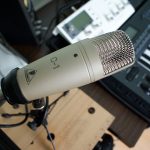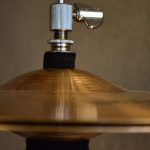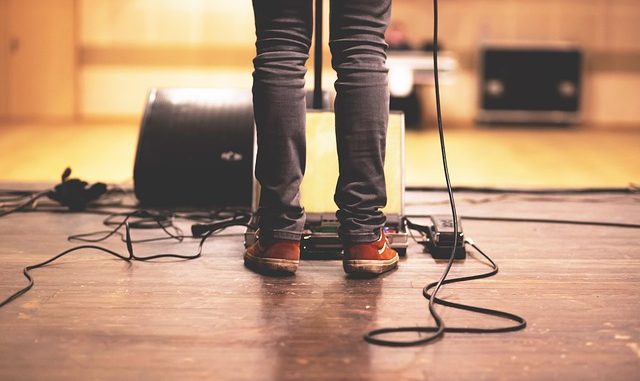
Bass is an often underrated and under-appreciated instrument. However, anyone who knows a lot about audio production knows how important a good bass guitar sound is. Getting the right sound is key, and as such you have to know how to record bass to a good standard, starting with the right equipment. In this article, we explore the best mics for bass guitars and bass amps for use in the recording studio, for home recordings and even for live use.
Recommended Microphones
On to our recommended mics. Many of these have been used in recording studios for many decades, and have stood the test of time for bass guitar recordings.
View Our Recommended Model of Bass Mic
AKG D112
Sometimes called the ‘Egg mic’ the D112 is a dynamic microphone with a reputation of picking up bass frequencies exceptionally well. The D112 mk ii and the original are both still available, and either will do an amazing job when it comes to recording bass drums, acoustic or electric bass.
The large diaphragm of this microphone is the main reason it has such an aptitude for picking up those lower sounds. A boost in the frequency response at 4 khZ also does an amazing job of cutting through mixes and making bass guitar really stand out in a fully mixed song.
Check Current Price and Reviews
There is an inbuilt him compensation feature which means that the humming noise we sometimes get with lower recordings can be quickly stripped away. On top of this, the build quality of the D112 is incredible. To call it rugged and hard-wearing is an understatement.
In many years of audio production, I am yet to go into a high-end recording studio that doesn’t have a D112, they are such versatile microphones for all things deep and bassy. The reviews on Amazon and other online retailers show a huge amount of satisfied audio engineers as the D112 continues to give industry-standard, pro recordings that other mics just can’t get. It isn’t the cheapest bass mic we’ve found, but it doesn’t cost the earth, especially compared to high range condenser microphones.
Shure BETA 52A Supercardioid
Most of our ‘best of’ lists for microphones feature some sort of offering from Shure. They’re one of the world’s best makers of mics and their products are mentioned on our hi-hat mic and overhead mic lists too.
The 52A is similar in appearance to the AKG D112, built to sit inside a kick drum if needed. It is very easy to fit into whatever space you want it to, with the mic offering a 180 degree rotation. The frequency range of this mic is perfect for both bass guitar amps and bass drums. The brilliant ‘punchy’ sound that shines through from the Shure BETA 52A can really make your bass stand out in the final mix.
Check Current Price and Latest Reviews
Shure have thought of everything. The shock-mounted system means that the mic rejects unwanted noise and buzz which can be a problem with loud, bassy instruments. The grille is made of hardened steel which means that it can withstand the abuse most microphones get both in live use and in the studio, especially if you are using one of these on a kick drum as well as your bass.
The main reason we recommend this for micing up a bass amp is the frequency response (detailed in the chart below) and the reliable Shure quality. A huge amount of positive reviews from the consumer audio community back up the fact that the 52A can compete with any bass mic.
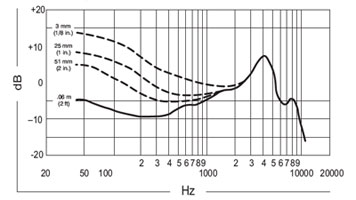
Sennheiser MD 421 II Cardioid Dynamic Mic
The top audio brands just keep coming. Sennheiser are popular for their headphones, but their mics are equally impressive as displayed by the MD 421.
We wanted to recommend a microphone which isn’t designed specifically for bass frequencies. The 421 (now in it’s mark II iteration) picks up frequencies brilliantly across the board, but a huge amount of audio engineers report it giving a meaty sound for bass guitars and electric guitars among other instruments. Though the D112 and 52A are amazing mics for picking up low-end, there’s no denying the MD 421 is more versatile. You probably don’t want to use it live, or in a kick drum, but for getting brilliant studio recordings of a bass guitar, it is hard to argue with.
Check out the current price of this microphone
This is a cardioid, condenser microphone, and as such is a little more sensitive. Hence not being recommended for live use, where it may get a little more of a bashing! A lot of enginners experiment with mic positioning and placement which has a huge impact on the sound when recording from an amplifier.
If you’re looking for a cheap bass mic, keep searching. This isn’t on the cheap end of the market. The price is justified for most studios by the fact that this can do a great job of picking up a variety of different instruments. You can use it for your piano, drum overheads, guitar, bass and just about anything else you can think of.
Audix D6 Dynamic Microphone
Much like the D112, the Audix D6 is almost an inevitable inclusion on the list. Preferred for bass frequencies in recording studios around the world, this is one of the most popular ‘bassy’ microphones you’ve ever come across.
The D6 has split opinion in the past, with many studios using it religiously, and some much prefer the alternatives.
It is hard to argue with the features. Built with bass cabs and drums in mind, the Audix mic has a response that can pick up frequencies as low as 30 HZ. Features are relatively limited, but it is a reliable mic with a brilliant VFM capsule. The Audix D6 is a very similarly built microphone to the D112 and the Shure Beta 52, and gives another option in a similar mold.
Notable Mention: Heimu Bass Drum Microphone
I want to make clear that you probably won’t be seeing this Heimu bass mic in any high-end studios soon. It isn’t as well made as the others and is designed to be a cheaper option for home recordings and gigging. Getting a set of mics for your drums can be costly, especially if you’re just starting out, but the Heimu is an option for those who need something that doesn’t cost the earth.
Designed for bass frequencies, this has some surprisingly good reviews considering the price range. It is a rugged little mic and is proof that it is better to have a suitable mic for the instrument you are recording than trying to make do with something less than perfect.
How Recording Bass is Different
Recording bass is quite a unique proposition. Most of the sounds we hear (and record) are not situated in the lower end of the audio frequencies.
Recording bass guitars, just like recording bass drums are a deeper, lower sound than other guitars, pianos or keyboards and most other instruments, and as such finding a microphone for bass sounds means finding one with a good response to these lower frequencies. A microphone that will make your guitar solos sound beautiful might make your bass sound terrible.
For vocal recordings or other guitar recordings, the sounds below 100 Hz will be redundant. For bass guitar, they play a key part in giving it a deep and punchy sound. This is why specific mics for bass are available.
The most similar recording you are likely to make is that of a kick drum (otherwise known as a bass drum). The kick drum and bass should work in tandem so many of the best kick drum mics are also good for bass guitars.
Bass Recording Tips
Recording bass is an art that can take a little while to master. There are different techniques and methods depending on the sound you wish to achieve. These techniques also differ by genre, whether you’re producing rock, metal, pop or jazz music! Our top tips for recording bass are as follows.
- Always take a DI recording too. A DI box or ‘direct input’ boosts the signal from your bass and can send it straight to a mixing desk or audio interface. This is a dry signal with no amp or effects but can be very useful for blending with the microphone recording or experimenting with amp modeling and effects afterward.
- Always take a dry recording too. Some bassists love to play around with effects, but once you’ve got them on a recording you can’t get them off. If you record dry, you can always add effects afterward.
- Tune your bass! This sounds almost patronizing, but it is amazing how often people record electric bass without a quick tune-up. This has a huge effect on the sound.
- Add compression. Compression is your friend! If you are to use effects when you are recording, get a compressor on your bass to tighten up the recording.
- Use a good amp. Don’t run a beautiful Rickenbacker bass through a terrible $30 amplifier and record it. This is sacrilege! A good quality bass amp is another key part of the process of recording, and shouldn’t be ignored.
Scott’s bass lessons on Youtube has some great info on recording bass, explained in the below video:
Conclusion
We’ve included bass microphones at a few different price ranges to try and suit everyone’s budget, but there’s little denying that this list has some of the classics. Bass specific microphones can be bought as part of drum mic ‘sets’ but these are often offered by one brand and don’t allow for a huge amount of experimentation.
The classic mics on our list won’t see you go far wrong. If you have any experience with these or other mics for bass, feel free to leave us a comment below explaining your thoughts.





